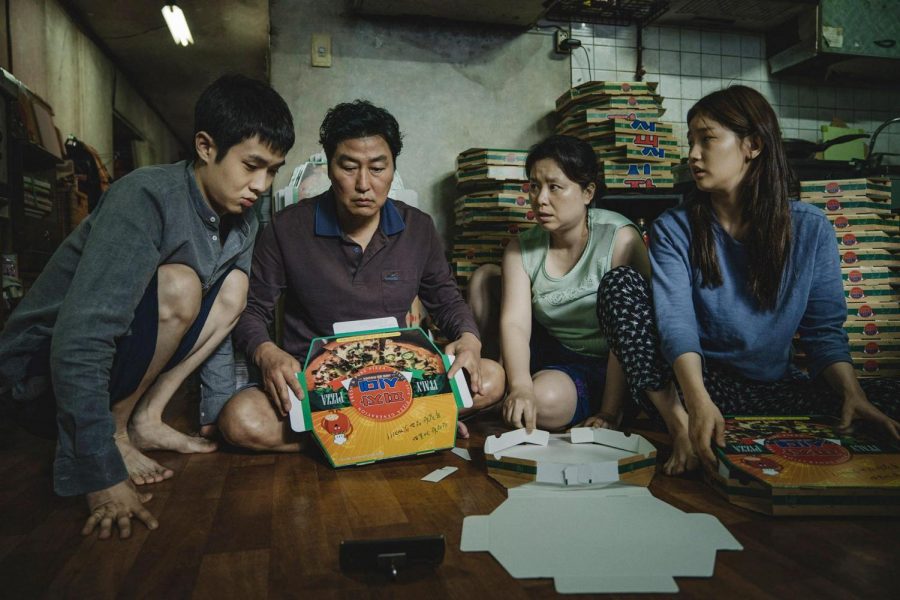“Parasite” and the rise of South Korean cinema
The Kim family (From left: Choi Woo-shik Choi, Song Kang-ho, Jang Hye-jin and Park So-dam) in “Parasite.” Neon/CJ Entertainment.
We are currently experiencing a golden age of South Korean cinema. A slew of international hits have poured out of the country over the course of the decade: “Train to Busan,” “The Wailing,” “The Handmaiden” and “Burning” are just a few of South Korea’s films making names for themselves on the international stage. And if there is one specific figure behind the attention South Korean cinema’s received this decade, that figure is Bong Joon-ho, director of “Snowpiercer” and “Okja.” Joon-ho is to South Korean cinema what Akira Kurosawa was to Japanese cinema, and by watching the focus of today’s review, “Parasite,” it is not hard to see why. With a magnificent directorial vision at its center, “Parasite” boasts itself as a significant work that must not be missed.
The less you know about this film, the better. Despite this, I, regrettably, must provide a brief paragraph-long synopsis. The events of the film follow a lower-income family in a South Korean city that infiltrate the house of an upper-class family by forging their way into jobs such as tutors, maids and personal drivers. It is more exciting than it sounds, I promise. The film is unpredictable and will leave you breathless if you are not prepared.
This film may not have been as notable if Joon-ho was not at the helm of it. Under his direction, the camera is just as expressive as the actors, and every set-piece is framed with clear intention. Joon-ho is in clear command of the tone, no matter where the story goes. He is constantly willing to break rules with deliberate crossing of the 180-degree line, willingness for characters to stare directly into the camera and increasing of the shutter speed during scenes that lack a need for it. So many rules are broken, and yet, the film comes together beautifully.
The way the story plays out is Shakespearean. There is a theatrical element to the way this film begs viewers to understand its status as a displayed story. Like many other South Korean films, “Parasite” is not self-important enough to convince audiences they are in the story. Characters explain things blatantly so that the most general audience understands what is going on. Of course, audiences do not notice this theatrical quality to the storytelling, as the story moves forward at a breakneck pace, jumping from one unpredictable moment to the next.
The acting in this film is exceptional. Every member of the ensemble embodies their roles extremely well. Every member of the lower-income family is distinct from the members of the higher-income family. The ensemble nature of the film also invites comparisons to the theatrical nature of the film’s story, though each character is more well-rounded than most theatrical productions would be able to pull off.
The set design is particularly evocative. The house belonging to the lower-income family is dingy—a sight for sore eyes, if you will—while the house belonging to the higher-income family—a film set, astonishingly—is appropriately lavish with its clean, minimalist detail. The film’s set design, complete with plenty of staircases, succinctly exemplifies not only South Korea’s class disparity, but perhaps class disparity around the globe.
“Parasite” is the cinematic epitome of upward mobility. Both in the sense that South Korean cinema has become a main focal point for film enthusiasts around the globe because of this film and in the sense that class disparity has not been this tastefully explored by a filmmaker in years—perhaps even decades. “Parasite” displays universal themes in a transcendent way. It is a significant work. It is not to be missed.












fejiro • Aug 22, 2020 at 6:17 am
Korean movies have always been my favorite. I get to see into another part of the world through Korean movies. I learn their manner of greeting, their style of food, their government system, and a lot more. sometimes I feel like I have been to Korea before, I just love the way they are presented in the movies. I have a long list of favorite Korean movies. please use this link to visit my site and i will really appreciate it. thank you.